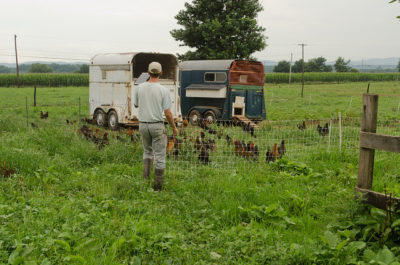 The Food Safety Modernization Act is being viewed by some as a war on small farmers and an attempt to curtail the local food movement – and the Food and Drug Administration (USDA) is getting an earful.
The Food Safety Modernization Act is being viewed by some as a war on small farmers and an attempt to curtail the local food movement – and the Food and Drug Administration (USDA) is getting an earful.
The public comment period for the proposed FDA mandates closed Nov. 22, and according to Food Safety News the agency received more than 11,500 comments on the produce safety proposal and over 5,200 on the prevent controls for processing foods proposal.
Statements from at least one official at the federal agency offered some encouragement for organic and other small farms – but only time will tell.
Congress approved the Food Safety Modernization Act in 2011, and the FDA has been working to implement the law. The recently concluded 10-month public comment period offered small and organic farmers, and fresh local food advocacy groups the opportunity to make their voices heard. Those opposed to the government mandates fear that the expensive equipment and upgrades necessary to remain in compliance with the law would put them out of business.
The locally grown food movement (food sovereignty) has increased in popularity, offering Americans the chance to know who grows their food and what is used during the cultivation process.
The FDA website calls the Food Safety Modernization Act (FSMA) the “most sweeping reform of food safety laws” in the past seven decades.
New Survival Seed Bank™ Lets You Plant A Full Acre Crisis Garden!
If FSMA regulations are enacted as written, farmers will be forced to document all wild animals which come into contact with their farms – a tall task for free-range farms.
FDA Deputy Commissioner of Food Michael Taylor said this when meeting with a group of Pennsylvania farmers recently:
We don’t have the mandate, the intent or desire to turn the produce sector on its head. There are a lot of genuine issues farmers have raised, and some of their comments reflect the need for us to clarify what we intended.
Before becoming the food safety policy chief at the FDA, Michael Taylor was a Monsanto attorney, a vice president for the biotech giant, and ultimately the chief lobbyist for the largest GMO corporation in the world. Farming is the largest industry in Pennsylvania. The 63,000 farmers who work the ground and raise livestock contribute nearly $70 billion to the state’s economy annually. Taylor went on to state that the Food Modernization Act regulations will call for “common steps” that farmers can easily utilize and will allow government inspectors to prevent instead or respond to illnesses.
Farmers and their allies are hopeful the government is listening.
“Everyone’s assuming that there will be major revisions to the draft rules as a result of the comments,” David Granatstein, sustainable agriculture specialist at Sustaining Agriculture and Natural Resources in Washington state, told Food Safety News. “People think there will be a second draft.”
Brian Snyder, executive director of the Pennsylvania Association for Sustainable Agriculture, told Pennsylvania media that the current proposal could be devastating:
This law could turn the tide and put a cap on the local food movement. We’ll stop seeing new farmers coming in, and those who are struggling will drop out. Some are struggling now and don’t make much money, but they keep doing it because they believe this is the future. They [FDA] had good intentions, but beneath the surface, there are consequences to small farms with thin profit margins. We will find out after this comment period closes just how serious the FDA is about considering stakeholder input.
The preservation of small farmers and organic growing operations helps to ensure that disruption to the food supply by either a man-made or natural disaster is at least a little bit less severe. Most preparedness experts and FEMA agree that food would disappear from grocery store shelves within three days after a disaster. How quickly supermarkets became bare after Hurricane Sandy should serve as a start reminder to us all how dependent America has become on “Big Ag” corporate farms and commercial delivery to fill our dinner plates.
How do you feel about the Food Safety Modernization Act?
 Off The Grid News Better Ideas For Off The Grid Living
Off The Grid News Better Ideas For Off The Grid Living




